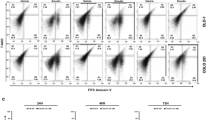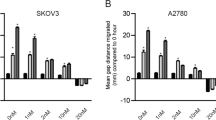Abstract
Purpose
Although an anti-tumor effect of emodin has been reported before, its effect on human gynecological cancer cells has so far not been studied. Here, we assessed the effect of emodin on cervical cancer-derived (Hela), choriocarcinoma-derived (JAR) and ovarian cancer-derived (HO-8910) cells, and investigated the possible underlying molecular and cellular mechanisms.
Methods and results
The respective cells were treated with 0, 5, 10 or 15 μM emodin for 72 h. Subsequently, MTT and Transwell in vitro migration assays revealed that emodin significantly decreased the viability and invasive capacity of the gynecological cancer-derived cells tested. We found that emodin induced apoptosis and significantly decreased mitochondrial membrane potential and ATP release in these cells. We also found that emodin may exert its apoptotic effects via regulating the activity of caspase-9 and the expression of cleaved-caspase-3. Moreover, we found that emodin induced a cell cycle arrest at the G0/G1 phase, possibly through down-regulating the key cell cycle regulators Cyclin D and Cyclin E. Interestingly, emodin also led to autophagic cell death, as revealed by increased MAP LC3 expression, a marker of the autophagosome, and decreased expression of the autophagy regulators Beclin-1 and Atg12-Atg5. Finally, we found that the protein levels of both VEGF and VEGFR-2 were significantly decreased in emodin-treated cells, suggesting an anti-angiogenic effect of emodin on gynecological cancer-derived cells.
Conclusions
Our results suggest that emodin exhibits an anti-tumor effect on gynecological cancer-derived cells, possibly through multiple mechanisms including the induction of apoptosis and autophagy, the arrest of the cell cycle, and the inhibition of angiogenesis. Our findings may provide a basis for the design of potential emodin-based strategies for the treatment of gynecological tumors.







Similar content being viewed by others
References
G. Srinivas, S. Babykutty, P.P. Sathiadevan, P. Srinivas, Molecular mechanism of emodin action: transition from laxative ingredient to an antitumor agent. Med. Res. Rev. 27, 591–608 (2007)
K. Eshun, Q. He, Aloe vera: a valuable ingredient for the food, pharmaceutical and cosmetic industries--a review. Crit. Rev. Food Sci. Nutr. 44, 91–96 (2004)
E. Harlev, E. Nevo, E.P. Lansky, R. Ofir, A. Bishayee, Anticancer potential of aloes: antioxidant, antiproliferative, and immunostimulatory attributes. Planta Med. 78, 843–852 (2012)
T. Pecere, F. Sarinella, C. Salata, B. Gatto, A. Bet, F. Dalla Vecchia, A. Diaspro, M. Carli, M. Palumbo, G. Palù, Involvement of p53 in specific anti-neuroectodermal tumor activity of aloe-emodin. Int. J. Cancer 106, 836–847 (2003)
H.Z. Lee, S.L. Hsu, M.C. Liu, C.H. Wu, Effects and mechanisms of aloe-emodin on cell death in human lung squamous cell carcinoma. Eur. J. Pharmacol. 431, 287–295 (2001)
H.Z. Lee, Protein kinase C involvement in aloe-emodin- and emodin-induced apoptosis in lung carcinoma cell. Br. J. Pharmacol. 134, 1093–1103 (2001)
P.L. Kuo, T.C. Lin, C.C. Lin, The antiproliferative activity of aloe-emodin is through p53-dependent and p21-dependent apoptotic pathway in human hepatoma cell lines. Life Sci. 71, 1879–1892 (2002)
M. Acevedo-Duncan, C. Russell, S. Patel, R. Patel, Aloe-emodin modulates PKC isozymes, inhibits proliferation, and induces apoptosis in U-373MG glioma cells. Int. Immunopharmacol. 4, 1775–1784 (2004)
S. Mijatovic, D. Maksimovic-Ivanic, J. Radovic, D. Miljkovic, L. Harhaji, O. Vuckovic, S. Stosic-Grujicic, M. Mostarica Stojkovic, V. Trajkovic, Anti-glioma action of aloe emodin: the role of ERK inhibition. Cell. Mol. Life Sci. 62, 589–598 (2005)
B.X. Xiao, J. Guo, The anti-proliferation and anti-migration dual effects of aloe-emodin on KB cells and its mechanism. Zhonghua Kou Qiang Yi Xue Za Zhi 44, 50–52 (2009)
J. Guo, B. Xiao, Q. Liu, Z. Gong, Y. Le, Suppression of C-myc expression associates with anti-proliferation of aloe-emodin on gastric cancer cells. Cancer Investig. 26, 369–374 (2008)
P. Suboj, S. Babykutty, P. Srinivas, S. Gopala, Aloe emodin induces G2/M cell cycle arrest and apoptosis via activation of caspase-6 in human colon cancer cells. Pharmacology 89, 91–98 (2012)
J.M. Guo, B.X. Xiao, Q. Liu, S. Zhang, D.H. Liu, Z.H. Gong, Anticancer effect of aloe-emodin on cervical cancer cells involves G2/M arrest and induction of differentiation. Acta Pharmacol. Sin. 28, 1991–1995 (2007)
S.Z. Lin, W.T. Wei, H. Chen, K.J. Chen, H.F. Tong, Z.H. Wang, Z.L. Ni, H.B. Liu, H.C. Guo, D.L. Liu, Antitumor activity of emodin against pancreatic cancer depends on its dual role: promotion of apoptosis and suppression of angiogenesis. PLoS ONE 7, e42146 (2012)
A. Liu, H. Chen, W. Wei, S. Ye, W. Liao, J. Gong, Z. Jiang, L. Wang, S. Lin, Antiproliferative and antimetastatic effects of emodin on human pancreatic cancer. Oncol. Rep. 26, 81–89 (2011)
R. Zeng, Z.W. Zhou, C.F. Wu, Y.L. Zhou, Reversal effect of aloe emodin liposomes on cisplatin resistance line A549/DDP human lung adenocarcinoma cells. Zhongguo Zhong Yao Za Zhi 33, 1443–1445 (2008)
B.S. Vinod, T.T. Maliekal, R.J. Anto. Phytochemicals as chemosensitizers: from molecular mechanism to clinical significance. Antioxid Redox Signal (2012)
G. Srinivas, R.J. Anto, P. Srinivas, S. Vidhyalakshmi, V.P. Senan, D. Karunagaran, Emodin induces apoptosis of human cervical cancer cells through poly(ADP-ribose) polymerase cleavage and activation of caspase-9. Eur. J. Pharmacol. 473, 117–125 (2003)
J. Li, P. Liu, H. Mao, A. Wanga, X. Zhang, Emodin sensitizes paclitaxel-resistant human ovarian cancer cells to paclitaxel-induced apoptosis in vitro. Oncol. Rep. 21, 1605–1610 (2009)
G. Hacker, S.A. Paschen, Therapeutic targets in the mitochondrial apoptotic pathway. Expert Opin. Ther. Targets 11, 515–526 (2007)
K. Mohankumar, S. Pajaniradje, S. Sridharan, V.K. Singh, L. Ronsard, A.C. Banerjea, B.C. Selvanesan, M.S. Coumar, L. Periyasamy, R. Rajagopalan, Apoptosis induction by an analog of curcumin (BDMC-A) in human laryngeal carcinoma cells through intrinsic and extrinsic pathways. Cell. Oncol. 37, 439–454 (2014)
C.Z. Birsu, M. Unlu, B. Kiran, B.E. Sinem, Y. Baran, B. Cakmakoglu, Anti-proliferative, apoptotic and signal transduction effects of hesperidin in non-small cell lung cancer cells. Cell. Oncol. 38, 195–204 (2015)
R. Shavit, M. Ilouze, T. Feinberg, Y.R. Lawrence, Y. Tzur, N. Peled, Mitochondrial induction as a potential radio-sensitizer in lung cancer cells - a short report. Cell. Oncol. 38, 247–252 (2015)
Z.T. Schafer, S. Kornbluth, The apoptosome: physiological, developmental, and pathological modes of regulation. Dev. Cell 10, 549–561 (2006)
L.H. Lian, E.J. Park, H.S. Piao, Y.Z. Zhao, D.H. Sohn, Aloe emodin-induced apoptosis in t-HSC/Cl-6 cells involves a mitochondria-mediated pathway. Basic Clin. Pharmacol. Toxicol. 96, 495–502 (2005)
K. Abbasi, S. Saeid, S. Mohammad, S. Najmaldin, The bone marrow metastasis niche in retinoblastoma. Cell. Oncol. (2015). doi:10.1007/3 13402-015-0232-x
L. Yu, L. Deng, J. Li, Y. Zhang, L. Hu, The prognostic value of vascular endothelial growth factor in ovarian cancer: a systematic review and meta-analysis. Gynecol. Oncol. 128, 391–396 (2013)
Y. Lu, J. Zhang, J. Qian, The effect of emodin on VEGF receptors in human colon cancer cells. Cancer Biother. Radiopharm. 23, 222–228 (2008)
J. Bai, Cycloheximide protects HepG2 cells from serum withdrawal-induced apoptosis by decreasing p53 and phosphorylated p53 levels. J. Pharmacol. Exp. Ther. 319, 1435–1443 (2006)
R. Rodriguez, M. Meuth, Chk1 and p21 Cooperate to Prevent Apoptosis during DNA Replication Fork Stress. Mol. Biol. Cell 17, 402–412 (2006)
N.A. Warfel, W.S. El-Deiry, p21 WAF1 and tumourigenesis: 20 years after. Curr. Opin. Oncol. 25, 52–58 (2013)
M. Radu, G. Semenova, R. Kosoff et al., PAK signalling during the development and progression of cancer. Nat. Rev. Cancer 14, 13–25 (2013)
S.K. Radhakrishnan, C.S. Feliciano, F. Najmabadi et al., Constitutive expression of E2F-1 leads to p21-dependent cell cycle arrest in Sphase of the cell cycle. Oncogene 23, 4173–4176 (2004)
Q. Cui, S. Tashiro, S. Onodera et al., Autophagy preceded apoptosis in oridonin-treated human breast cancer MCF-7 cells. Biol. Pharm. Bull. 30, 859–864 (2007)
S. Yousefi, R. Perozzo, I. Schmid et al., Calpain-mediated cleavage of Atg5 switches autophagy to apoptosis. Nat. Cell Biol. 8, 1124–1132 (2006)
D.R. Green, J.E. Chipuk, P53 and Metabolism: inside the TIGAR. Cell 126, 30–32 (2006)
D. Crighton, S. Wilkinson, O, Prey J, et al. DRAM, a p53-induced modulator of autophagy, is critical for apoptosis. Cell 126, 121–134 (2006)
T. Kanzawa, Y. Kondo, H. Ito et al., Induction of autophagic cell death in malignant glioma cells by arsenic trioxide. Cancer Res. 63, 2103–2108 (2003)
H. Yanagisawa, T. Miyashita, Y. Nakano et al., HSpinl, a transmembrane protein interacting with Bcl-2/Bcl-xL, induces a caspase-independent autophagic cell death. Cell Death Differ. 10, 798–807 (2003)
K.H. Maclean, F.C. Dorsey, J.L. Cleveland et al., Targeting lysosomal degradation induces p53-dependent cell death and prevents cancer in mouse models of lymphomagenesis. J. Clin. Invest. 118, 79–88 (2008)
W. Jeon, Y.K. Jeon, M.J. Nam, Apoptosis by aloe-emodin is mediated through down-regulation of calpain-2 and ubiquitin-protein ligase E3A in human hepatoma Huh-7 cells. Cell Biol. Int. 36, 163–167 (2012)
W.T. Wei, H. Chen, Z.L. Ni, H.B. Liu, H.F. Tong, L. Fan, A. Liu, M.X. Qiu, D.L. Liu, H.C. Guo, Z.H. Wang, S.Z. Lin, Antitumor and apoptosis-promoting properties of emodin, an anthraquinone derivative from Rheum officinale Baill, against pancreatic cancer in mice via inhibition of Akt activation. Int. J. Oncol. 39, 1381–1390 (2011)
D.L. Liu, H. Bu, H. Li, H. Chen, H.C. Guo, Z.H. Wang, H.F. Tong, Z.L. Ni, H.B. Liu, S.Z. Lin, Emodin reverses gemcitabine resistance in pancreatic cancer cells via the mitochondrial apoptosis pathway in vitro. Int. J. Oncol. 40, 1049–1057 (2012)
A. Liu, Y.S. Hu, Z.H. Wang, L.L. Tang, P.Y. Ke, S.Z. Lin, Role of nuclear factor-kappaB on emodin-induced sensitization of pancreatic cancer to gemcitabine. Yao Xue Xue Bao 46, 146–152 (2011)
A. Liu, H. Chen, H. Tong, S. Ye, M. Qiu, Z. Wang, W. Tan, J. Liu, S. Lin, Emodin potentiates the antitumor effects of gemcitabine in pancreatic cancer cells via inhibition of nuclear factor-kappaB. Mol Med Rep 4, 221–227 (2011)
M.L. Lin, Y.C. Lu, J.G. Chung, Y.C. Li, N.G.S.H. Wang SG, C.Y. Wu, H.L. Su, S.S. Chen, Aloe-emodin induces apoptosis of human nasopharyngeal carcinoma cells via caspase-8-mediated activation of the mitochondrial death pathway. Cancer Lett. 291, 46–58 (2010)
S. Mijatovic, D. Maksimovic-Ivanic, J. Radovic, D. Miljkovic, G.N. Kaludjerovic, T.J. Sabo, V. Trajkovic, Aloe emodin decreases the ERK-dependent anticancer activity of cisplatin. Cell. Mol. Life Sci. 62, 1275–1282 (2005)
Acknowledgement
This study was supported by funds from the Education Department of Heilongjiang Province (No. 12541274), the Postdoctoral Fund of Heilongjiang Province (No. LBH-Z13150), the Outstanding Youth Science Foundation of Heilongjiang Province (JC201108) and the National Natural Science Foundation (No. 81372786).
Conflict of interests
The authors declare that there is no conflict of interest.
Author information
Authors and Affiliations
Corresponding author
Additional information
Yaoxian Wang and Hui Yu contributed equally to this work.
Rights and permissions
About this article
Cite this article
Wang, Y., Yu, H., Zhang, J. et al. Anti-tumor effect of emodin on gynecological cancer cells. Cell Oncol. 38, 353–363 (2015). https://doi.org/10.1007/s13402-015-0234-8
Accepted:
Published:
Issue Date:
DOI: https://doi.org/10.1007/s13402-015-0234-8




